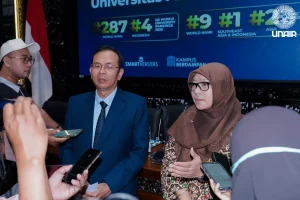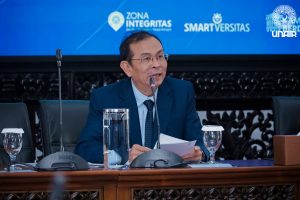UNAIR NEWS – The Polling Station Working Committees (KPPS) is set to play a crucial role in the upcoming General Election (Pemilu) on Wednesday, Feb 14, 2024. However, it’s disheartening to note that 894 KPPS officials lost their lives in the previous election, as reported by Kompas.id.
Doctor and lecturer at the Faculty of Medicine (FK) UNAIR, Dr., Andrianto, dr., Sp.JP., SubSp.IKKv(K), FIHA, FAPSC, FESC, also sheds light on the tragedy. The analysis by the General Election Commission (KPU) indicates that the main causes of the fatalities were underlying health conditions and the heavy workload.
Although members of KPPS are now required to present a health certificate upon registration, this is not a guarantee that such incidents won’t happen again. According to Dr. Andrianto, the certificate provides little assurance, especially given that many cardiovascular conditions are asymptomatic.
“Cardiovascular diseases frequently present without symptoms, which should be cause for concern,” he told UNAIR NEWS on Monday, Feb 12, 2024.
To perform extra tasks, an individual must be both physically and mentally prepared. This readiness starts before duties begin and continues until the KPPS officials’ tasks are completed.
Tips for staying healthy
Dr. Andrianto highlights the significance of preventing fatigue among election officials leading up to election day, recognizing the challenges in their preparations. Hence, effective time management for adequate rest, along with a clear understanding of when to work and when to take breaks, becomes crucial.
During the election itself, the same principle holds. Despite the imbalance between rest and workload during its execution, KPPS officials can strategically manage their time to refill energy, even if only briefly.
“Officials must manage their workload to avoid excessive burdens. Careful scheduling of break times is essential so that the body has time for recovery,” he said.
Secondly, dietary diversity also contributes. He does not recommend doping, a term the public is familiar with, which involves taking certain medications to strengthen the body.
“There’s no need for doping. A doping system can leave the body in an unfit state and result in counterproductive excessive activation,” he said.

Lastly, understand yourself. If your body sends signals of fatigue, shortness of breath, or a rapid heartbeat, be aware and promptly seek medical attention.
“Heart conditions improve the sooner we respond,” he said.
Fainting
When someone faints, Dr. Andrianto advises checking their breathing and pulse in advance. Once both have been detected, the patient just needs to lie down with their legs elevated higher than their head for 10 to 15 minutes. Such patients should rest and proceed to a more detailed examination at a healthcare facility.
However, the situation is different if a patient stops breathing and no pulse is detected, especially due to cardiac arrest. Dr. Andrianto emphasized that if the chances of survival from cardiac arrest are low, immediate resuscitation efforts must be initiated.
“When resuscitation efforts can be carried out within 20 minutes, 1 out of 5 can survive. If it involves cardiac emergencies, blood vessels, and nerves, it is highly related to the quickness and accuracy of treatment,” he said.
Author: Muhammad Badrul Anwar
Editor: Nuri Hermawan









